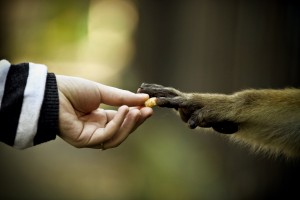 Me? Host Thanksgiving? You’ve got to be crazy!
Me? Host Thanksgiving? You’ve got to be crazy!
Stress and Sibling Position
The importance of sibling position didn’t really come up in our family until the Thanksgiving my older sister had reasons she couldn’t host the big meal. She announced this alteration to life’s grand plan at a Sunday dinner in September. My younger brother and I gawked at each other with horror.  What now?
What now?
Oldest sisters do the big occasions dinners, everyone knows that. He and I aren’t the oldest. We are not responsible enough for that kind of job.
As the younger sister, I’d be there to entertain the folks around the table as we politely waited to be served. And my younger brother, well, he’d be late, out picking up a few last minute items. You know, something like a battery for the train set he was going to set up for his grandson next Christmas. 
How We Learn Functioning Position in the Family:
Psychology has a lot of fairy tale explanations for behavior but when it comes to the influence of sibling position we are operating with facts. Each of us acquires functional skills as part of the natural process of family. There’s nothing weird, wrong, of magical about sibling positions. Sibling positions fit with reality.
Mom and Dad, on leaving the house, do not turn to the youngest child and say, “Now you watch your brother and sister.” That would be nuts. It might be “cute” and funny when the baby of the family falls into the Christmas tree, but not so much when the oldest is “careless” and causes the same mishap.

NICKEL THERAPY: Ask a Psychologist
Sibling positions matter because how we learn to function in the family can, and usually does, affect how we approach other areas of life. For example, a man who is an ‘older brother of sisters’ is more likely to take a more dominating position in marriage and is, in fact, likely to marry a woman who is a ‘younger sister of a brother’—a woman seeking to replicate the harmony learned in the family. Two ‘youngest’ children marrying can result in a couple that has a good time but is lousy at managing finances and long term plans. The oldest is more likely to finish college. The youngest is likely to have more friends. Two oldest married to each other are more likely to struggle over who is in charge.
 When in anxious situations, a younger born is more likely to look around for guidance and an oldest is more likely to take charge. Both of systems of managing anxiety. The fun comes in when two oldests are in an anxious situation. Conflict all over the place. With two youngests, both try to beat the other at backing out of the leadership role.
When in anxious situations, a younger born is more likely to look around for guidance and an oldest is more likely to take charge. Both of systems of managing anxiety. The fun comes in when two oldests are in an anxious situation. Conflict all over the place. With two youngests, both try to beat the other at backing out of the leadership role.
** Alert: Watch out for Over Generalizations
The above statements refer to general features and the learning situation of every individual is unique. 
In any area of psychology, we have to be careful to not over-generalize and ‘use’ basic concepts to explain behavior or to think we know all of why a person is the way he or she is. It’s great to have definitions that help us see why and how we are different from each other—for example, it can be helpful to identify different communication styles. But when we use terms to explain the functioning of an individual we are usually selling that individual short. And we can be quite annoying.





